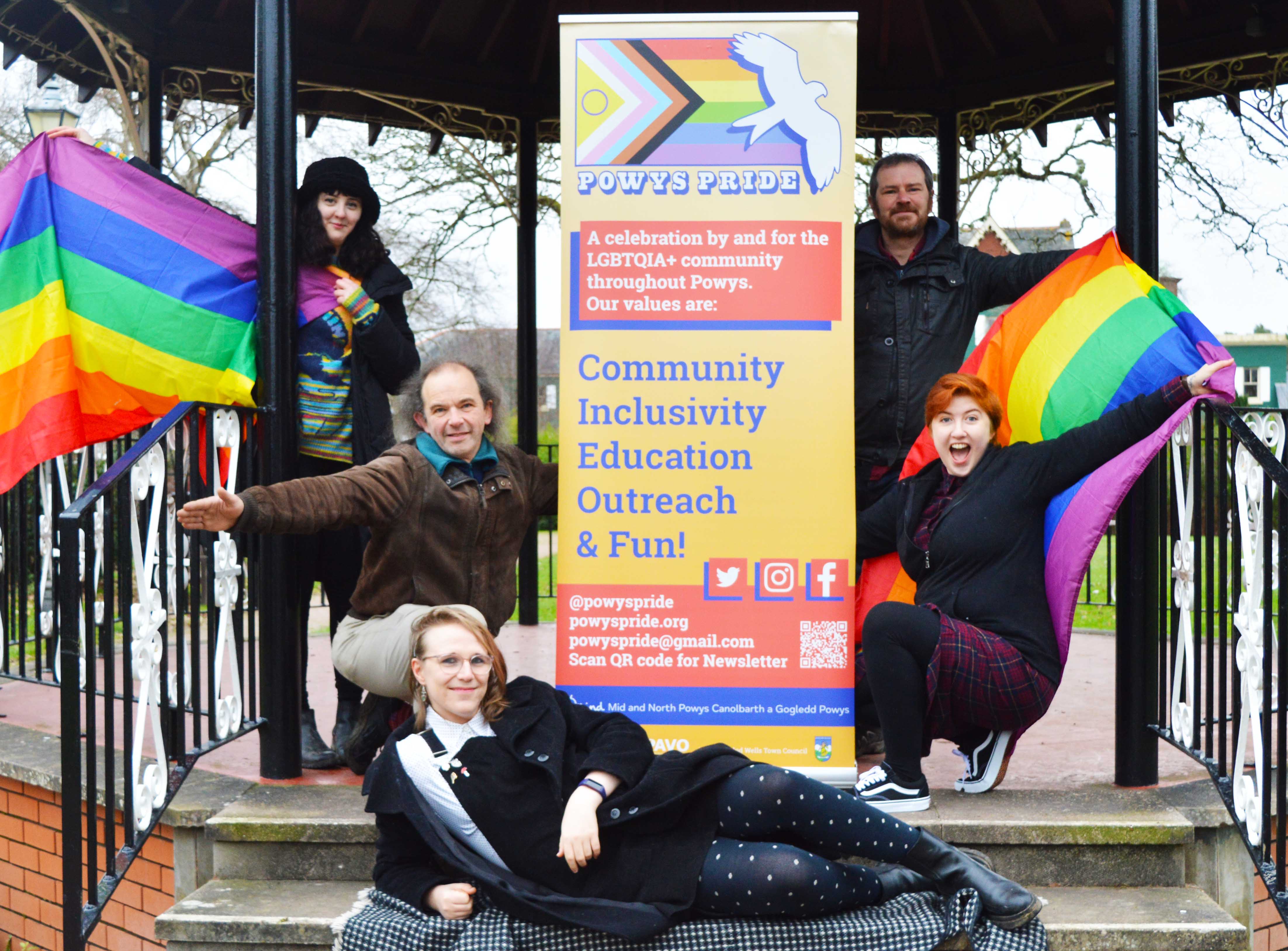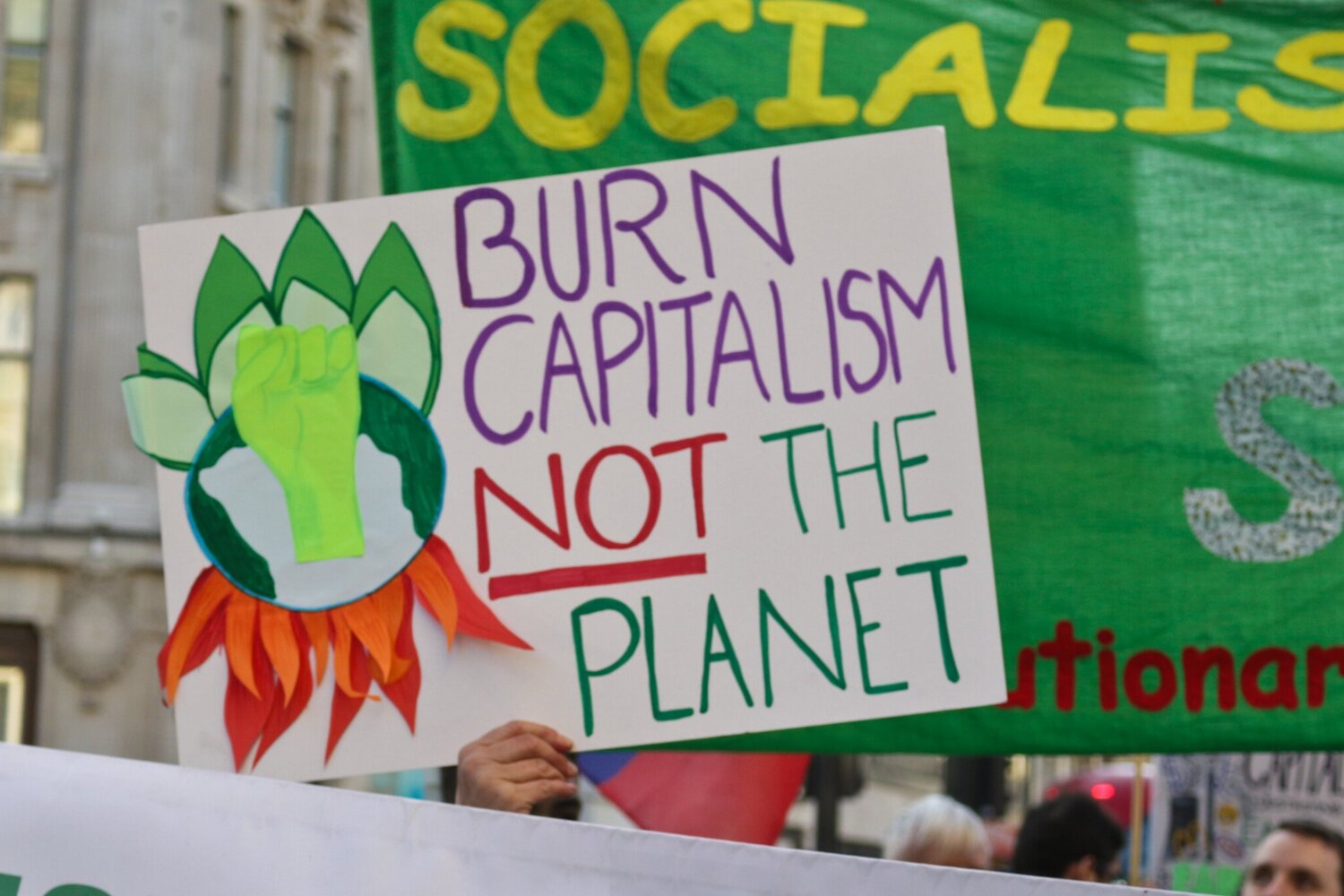
Finding A Queer Community In Rural Wales Has Been A Revelation | Ivy Taylor
“For the first time there was an openly queer community for people in Powys; it meant that if I was growing up here today, there would be a place I could go and figure out who I am with people who understand me.“
Ivy Taylor
Image: Powys Pride organisers in Llandrindod
February is LGBT History Month, which is by far my favourite of the themed months. Unlike Pride Month in June, it has yet to be completely co-opted by the all consuming hivemind of capitalism, like the Borg with a rainbow flag.
Yet we still get to enjoy all the hottake social media posts from tonedef organisations like the LGB Alliance, which attempted to celebrate this month without acknowledging trans people, while also inadvertently highlighting the power of mutual support between marginalised groups. An incredible feat of doublethink that would impress any member of the Inner Party.
For the unitiatied, Lesbian, Gay, Bisexual and Transgender History Month is intended to “promote equality and diversity for the benefit of the public.” The month reportedly has its origins in a Missouri high school in 1994, thanks to a history teacher named Rodney Wilson. It’s since grown into a global affair, and is observed in the UK, Ireland, Canada, Hungary, United States, and Australia. So I wanted to take this opportunity to talk a little bit about the power of community, especially in rural areas of Wales where being queer is often a very isolating experience.
The long history of LGBT rights is not something I am going to explore here, but it’s worth noting despite the forward leaps that have been made, last year 21% of queer people in the UK experienced a hate crime accordig to LGBT charity Stonewall. That number rose to 34% for black, Asian and minority ethnic people, and 41% for trans people.
I know that statistics like this are boring, and that they do very little to convince anyone of anything. Humans are emotional creatures, we feel more than we think, no matter what any classical or neoliberal tells you about the arch rationality of mankind.
I mention it nonetheless, because no matter what you or I think of those numbers, they are real stories, about real people who are unsafe because of who they love, the gender identity, or the colour of their skin.
I’ve long held the view that rural communities are less progessive and accepting than their urban counterparts, and that life is easier and safer for queer people in cities. But I’ve since come to realise that the challenges are merely different, as opposed to one being “harder” than the other.
I grew up in Powys, the largest and most rural county in Wales by a considerable margin. It was the heady days of 2005, all the kids were using Bebo, the Motorola Razr was the hottest game in town, and Australian soap opera Neighbours had just begun airing its first ever lesbian story arc. Inspired by this radical new world, I decided it was the perfect time to tell my entire school year that I was bisexual.
As a quiet, awkward, and already unpopular nerd who was undiagnosably queer at the time, it was very out of character for me to be so bold and the entire thing quickly turned into a diaster. I was mercilessly bullied, and careened right back into the closet for the next 16 years. I finally emerged at the age of 31, shortly after accepting I was actually a trans woman which was both the most and least surprising thing to ever happen to me.
There is a certain grief that comes with realising that you’ve lived your entire life as a lie however. Like a terrible fever dream that stole three decades. I always knew something was deeply wrong with the notion that I was a man, though I was unable to articulate why and I didn’t know anyone who could relate to what I was feeling. As such, any further attempts to examine this idea were promptly vaporised by denial. I decided it was for my own protection. To entertain the thought was to invite in the truth, and the truth had already proven impossibly dangerous.
Things have changed over recent years though, for both better and worse. There are more openly trans people in Wales than ever before, but we are constantly demonised as the latest cultural boogeyman in the British press, supposedly lurking in women’s bathrooms like a horny xenomorph in a wig ready plant our eggs in the belly of any cis woman who needed to pee – or whatever it is Graham Linehan and She Who Must Not Be Named thinks we want to do in there, other than just piss and shit like everyone else.
I think the reason it I often assumed that life is harder in rural areas for queer people comes not just from my own bad experience, but also from a broader cultural misconception; the assumption that rural communities are backwards, homophobic, racist – whatever it may be. But more recently, I’ve come to realise that’s not the problem. Yes, homophobia and transphobia remains a systemic issue no matter where you live, but on a very practical day-to-day basis it’s because of rural isolation. An issue almost anyone living rurally has to face.
The trans community in Cardiff is unlike anything I’ve ever seen in Powys, but it’s also a two hour drive. When that’s where your nearest people are, it stops feeling like a community and starts feeling like an aspiration. Any perception of rural Wales as a homophobic backwater is a self perpetuting cycle, as queer people leave to find community elsewhere, meaning there is no foundation for the younger queer generation growing up in these areas.
I was one such person though. I left Powys, and lived in Brighton for three years. I didn’t know who I was, but I knew I didn’t feel safe here. It was when I began to meet more queer people, especially other trans people who lived authentically and were happier for it, that I slowly began to open myself to the idea of my true self. But I am a country girl at heart and nothing really compares to the beauty and atmosphere of rural Wales.
These days I don’t believe Powys is more homophobic or transphobic on average than anywhere else in Wales or even the UK. And now that I’m back here, I never want to leave. I want to lay down some roots, and make a space where I can grow old. That’s why I volunteered to help organise the first ever Powys Pride, set to take place in Llandrindod Wells on July 16; to bring together the atomised pieces of rural queerness and make something whole.
So far there are just a handful of us, but we are an ambitious bunch, and we’re working to make Pride more than just one day in the calendar. It’s a movement and it’s a community.
Finding this small group tucked away in the corner of my home county, where previously there had been nothing, was a revelation. For the first time there was an openly queer community for people in Powys; it meant that if I was growing up here today, there would be a place I could go and figure out who I am with people who understand me. When you consider that nearly half of all trans people attempt suicide at some point, it can literally save lives. Community is everything, and if it doesn’t exist, you have to build it.


Flooding Devastated My Community, We Deserve a Public Inquiry to Reveal the Truth | Heledd Fychan